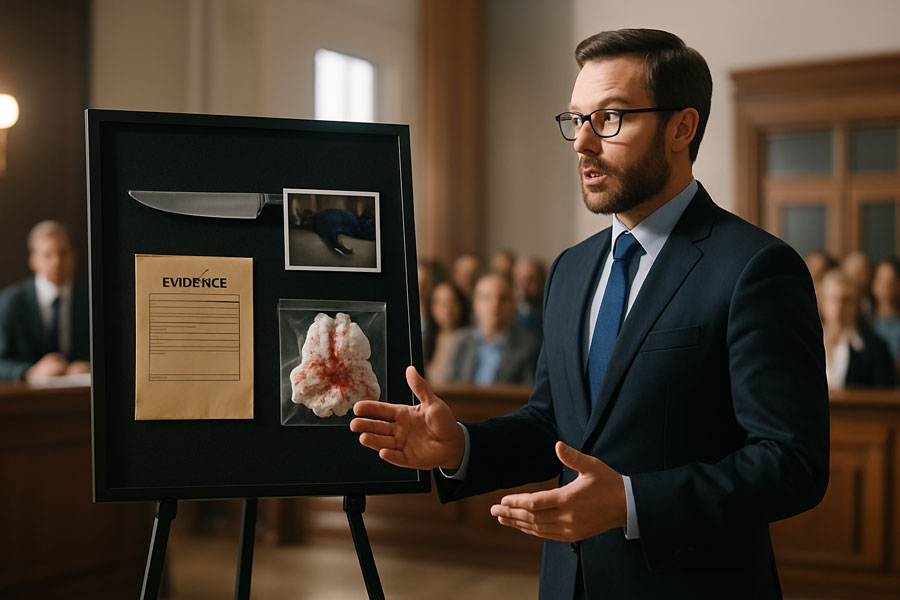
In the pursuit of justice, physical evidence often tells a story that words cannot. However, that story needs a translator. A jury needs a guide to understand the complex language of science. This is where forensic experts step in. Their role culminates in the delivery of expert witness testimony, a critical component of the legal process that can affirm or dismantle a case. This testimony is not merely a statement; it is the final product of meticulous collection, rigorous analysis, and unwavering ethical standards. Understanding this process reveals the immense pressure and responsibility placed upon the shoulders of forensic professionals.
The Foundation: From Crime Scene to Courtroom
The journey of a forensic opinion begins long before anyone enters a courtroom. It starts at the crime scene. A Crime Scene Investigator or forensic investigator has the initial, crucial task of identifying, documenting, and collecting evidence. Their work must be flawless. They follow strict protocols to prevent contamination and preserve the integrity of every item. Each piece of evidence, from a latent fingerprint to a single fiber, is a question waiting to be answered.
This evidence then travels to the laboratory. Here, a forensic analyst or a forensic specialist takes over. This could be a fingerprint examiner tasked with analyzing a partial print, or a DNA analyst processing a biological sample. These forensic scientists use validated, scientific methods to analyze the evidence. Their goal is to produce objective, repeatable, and defensible results. The opinion they form in the lab is the foundation of their future testimony.
Preparing for the Stand: The Expert’s Homework
An expert’s performance on the witness stand is directly proportional to their preparation. Before testifying, a forensic expert engages in a meticulous review process. They re-examine their case file, notes, and all analytical data. They must know every detail of their work inside and out.
Furthermore, preparation involves several key steps:
This exhaustive preparation ensures the expert witness testimony is delivered with confidence and clarity. It fortifies the expert against the challenges ahead.
Delivering Expert Witness Testimony: Direct Examination
Direct examination is where the expert presents their findings to the court. The attorney who retained them asks a series of open-ended questions. This allows the forensic specialist to explain their qualifications, their methodology, and their conclusions to the judge and jury.
The primary goal here is education. For example, a fingerprint examiner must first explain the science of fingerprints—that they are unique and permanent. Then, they describe the ACE-V method (Analysis, Comparison, Evaluation, Verification) they used. Finally, they present their conclusion about whether a latent print from the scene matches the known print of a suspect.
Throughout this process, effective communication is paramount. The expert must avoid overly technical jargon. They must connect with the jury, building trust through their competence and clear explanations. This is the core of effective expert witness testimony.
The Crucible: Facing Cross-Examination
After direct examination comes the ultimate test: cross-examination. The opposing attorney now has the chance to question the expert. Their goal is to find weaknesses in the testimony and create doubt in the minds of the jury.
An opposing attorney might challenge the expert on several fronts:
A well-prepared forensic expert remains calm and professional under this pressure. They answer questions truthfully and directly. They stick to the facts of their analysis and do not stray into speculation. Defending their work against intense scrutiny is a hallmark of a credible expert. This rigorous process, while challenging, is essential for ensuring the integrity of the expert witness testimony and the legal system itself.
The Impact: How Forensic Opinions Shape Justice
The impact of compelling expert witness testimony cannot be overstated. It can be the deciding factor in a case. When a jury understands and trusts the science presented, it gives them a factual anchor in a sea of conflicting narratives.
The work of various forensic scientists often interlocks to create a comprehensive picture. For instance, a forensic investigator might testify about where a weapon was found. A fingerprint examiner then testifies that the suspect’s prints were on that weapon. Subsequently, a DNA analyst might testify the victim’s blood was also on it. This layering of expert testimony creates a powerful and cohesive story that is difficult to refute.
Ultimately, the opinion of a forensic analyst provides an objective voice. They are not advocates for either side; they are advocates for the evidence. This commitment to scientific truth is what gives their testimony its profound weight and helps guide the court toward a just outcome.
Conclusion: The Voice of the Evidence
The journey from a crime scene to the witness stand is long and demanding. It requires precision, expertise, and unshakable integrity. Expert witness testimony is the critical moment where science officially enters the legal record, explained by a trusted and qualified professional. The men and women who serve as forensic experts—from the Crime Scene Investigator to the lab-based forensic specialist—provide an essential service. They give a voice to the silent evidence, ensuring that facts, not fiction, form the foundation of justice.
by Kourosh Nikoui | June 28, 2025 | Uncategorized
Forensic Practitioner and Specialist Kourosh Nikoui, Principal Consultant and CEO of Nikoui & Associates, Forensic Identification Services & Consulting, Inc., has over 38 years of full-time experience in forensic science and criminal justice with various law enforcement agencies, government and private entities. Mr. Nikoui, a court-qualified expert, is a Certified Latent Print Examiner, Certified Senior Crime Scene Analyst, and Certified Forensic Photographer by the International Association for Identification. He has testified as an expert witness over 150 times in California Superior and U.S. Federal Courts, processed evidence in over 30,000 criminal and civilian cases, and served as a consultant to numerous law enforcement agencies. Mr. Nikoui holds a BFA degree from USD and is an active member of multiple forensic science organizations. He can be reached directly by calling (866)439-6753 or by email at [email protected]. Please visit Mr. Nikoui’s website at www.nikouiandassociates.com
Sources & Further Reading